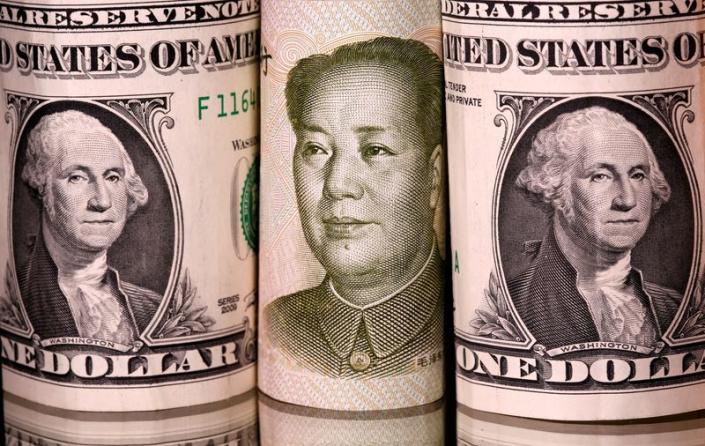Investors in China will keep a hawk eye on results from the US presidential election, with the country’s equities and currency being especially vulnerable to the poll’s outcome.
Experts have already said that China’s technology will remain in Washington’s firing line, regardless of whether Democratic nominee Kamala Harris or her Republic challenger Donald Trump win the election.
But the election’s impact on Chinese markets will be less clear cut, except that a protectionist shift in US politics will spell further bad news for the country’s currency and equities.
What happens to the yuan?
Investors say a win for Trump, particularly if accompanied by a Republican sweep of Congress, is expected to squeeze the yuan. And a victory for Harris will likely result in opposite trades.
China’s currency is tightly managed. Still, or perhaps because of that, it is expected to fall if the US hikes tariffs on Chinese goods.
Also on AF: US-China Tech War Seen Continuing Under Trump or Harris
China is seen on the front line of tariff risk and its currency in particular is trading on tenterhooks with implied volatility against the dollar around record highs.
Analysts see the yuan sliding to 7.3 per dollar or beyond should Trump – who promises dramatically higher tariffs – win the presidency and especially if Republicans control Congress and the White House.
Those expectations are already building pressure on the currency.
On Tuesday, the yuan slipped from a three-week high against the dollar to trade lower at 7.1052 as some investors rushed to book profit amid uncertainty around the election.
A rebound may occur, however, if Harris wins office, driving the yuan towards 7 per dollar or below.
In the longer run the exchange rate will be driven by the large gap between US and Chinese yields that is likely to persist regardless of the election result and by the trade policy actually imposed by any incoming administration.
What happens to China’s stocks?
China’s equity market is in the midst of recovering from a years-long slump as authorities promise to address weak consumption and a downturn in the real estate sector.
The election is peripheral to that. In fact, despite election uncertainty, Chinese stock markets surged to almost one-month highs as investors expect a meeting of top policymakers in Beijing this week to approve local government debt refinancing and spending.
But much like the yuan, Chinese export sectors shares will likely still struggle to gain ground if Trump wins Tuesday’s election.
Textile, computer, machinery and home appliance makers would likely be sold as a result, analysts at Huatai Securities said.
On the other hand, defence and telecom stocks will likely receive a boost from a Trump victory, they said, with investors seeking out sectors likely to benefit from state support or those paying handsome dividends.
But since both Democrats and Republicans are relatively united in antagonism to China. Markets may not react dramatically until there are concrete policy changes announced.
Sanctions-exposed sectors will remain vulnerable to both Trump and Harris’s victories.
What happens to offshore assets?
Hong Kong stocks and US-listed depositary receipts may be more volatile as they tend to be traded by foreigners and used by hedge funds who want to bet against Chinese assets.
Index futures and stocks like Hong Kong-listed China internet companies have retraced almost half their recent gains and are likely to be vulnerable if investors go short to hedge election risks.
Selling in Hong Kong could also pressure the Hong Kong dollar or widen the premium of mainland stocks against Hong Kong-listed counterparts.
- Reuters, with additional editing by Vishakha Saxena
Also read:
Yuan Suffers Biggest Dip in a Year, Amid Fear of Trump Poll Win
Trump Says He’ll Hit China With Big Tariffs if it Takes Taiwan
US Chipmaker Fined $500,000 for Chips Sent to China – NYT
Chinese Solar Firms Shift Bases in SE Asia to Avoid US Tariffs
China Hackers Targeted Trump Family, Biden Aides, NYT Reports
US Rules to Limit Investment in China’s Chips, Quantum and AI
China ‘May Issue $1.4 Trillion in Extra Debt Over a Few Years’
























